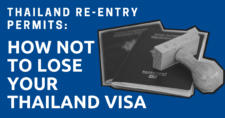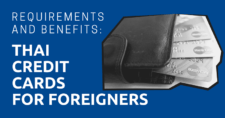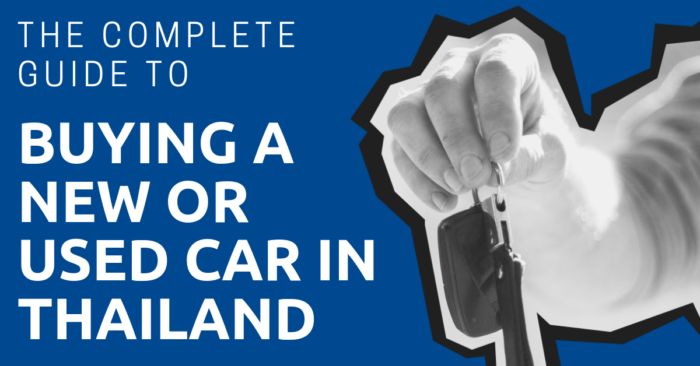
The quality of life and freedom that owning a car gives you is incomparable.
The public transportation systems are unreliable in most parts of Thailand and having a car is necessary for many. Sure Bangkok has the BTS and MRT. And most major towns and cities have a van network and local buses or songthaews. But these don’t serve the needs of everyone.
In general, all over Thailand, the public transportation systems are inadequate. For those who live in places like Chonburi, Phuket, and Chiang Mai subway lines and sky trains are still a distant dream. So, to live in Thailand conveniently, having a car can be important.
You can talk to other expats who have been through the process of buying a car, and snoop around online to get an idea of prices. But in Thailand, you have to prepare for things to be a bit more complicated than they might first appear.
Let us help you.
"*" indicates required fields
Disclaimer: This article may include links to products or services offered by ExpatDen's partners, which give us commissions when you click on them. Although this may influence how they appear in the text, we only recommend solutions that we would use in your situation. Read more in our Advertising Disclosure.
Contents
(And How It’s Costing Them)
Most expats throw money away, get lost in red tape, and miss the local hacks that make life easier and cheaper. ExpatDen Premium gives you the secrets seasoned expats use to save, earn, and thrive beyond the basics, saving you thousands and opening doors you didn’t even know existed.
Here’s what’s inside:
- Housing Hacks: Slash your rent by 40% or more - because the locals are laughing at what you’re paying.
- Banking Mastery: Stop wasting on fees and get top exchange rates. Why give your money away?
- Healthcare for Local Prices: Quality treatment without the expat price tag.
- Visa and Legal Shortcuts: No more bureaucratic nightmares. Get the visa and residency secrets that others pay their lawyer dearly for.
- Deep Discounts: Find the savings locals rely on for groceries, dining, and more.
If you’re serious about making Thailand work for you, join ExpatDen Premium and make Thailand work for you.
Why Do You Need a Car in Thailand?
First up, think about whether or not you really need one. They are a big expense and a lot of potential headaches.
There are four main points that make buying a car a good option to you:
- Location: Unless you live in the downtown Bangkok, having a car can significantly improve your quality of life and help you get around much easier. On the other hand, if you live in the downtown, driving a car can be a nightmare because of traffic.
- Travel outside of the downtown area: If you need to travel outside the downtown area for business, it becomes a necessity to have private transportation.
- Weekend trips: Having a car give you more options for weekend trips outside of the big city.
- Family: One common reason for buying a car in Thailand is for when you have a family and don’t want to rely on public transportation. A car is the safest and most convenient way to transport your family around. Having your own car makes for great road trips with the kids.
Sidenote: If you are living in a condo or an apartment think about parking. Does your condo or neighborhood allow it? This can be a very expensive after thought if you don’t have access to a safe parking space.
You might also want to read:
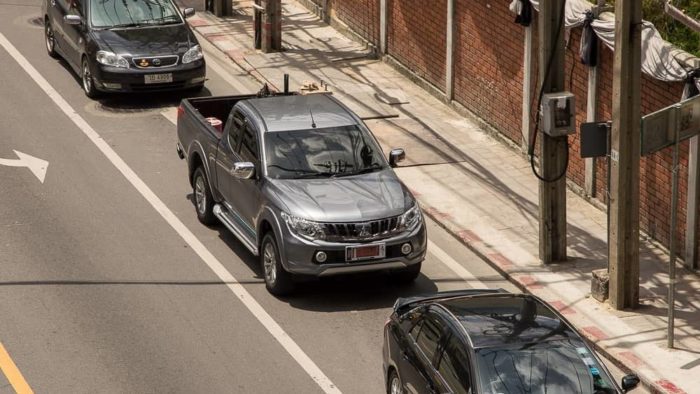
Long Term vs Short Term
A key factor for many expats to consider is whether they will be staying in the country for a long- or short-period of time.
Long-term expats have more reason to buy a car as it is a considerable financial investment in Thailand. Those married on retirement visas, or those with full-time jobs who stay for the long haul could benefit from having a car.
Those here for a short period need to consider the resale value of their car and how easy it’ll be to sell. As you’ll see, there is quite a bit of paperwork involved when selling a car.
For those here for a short time, it might not be the best option. You also need to consider that if you must leave Thailand on a certain date the car needs to be sold by then which could cause problems if you are rushing to find a buyer.
There is always the option of leasing a car for a period of a few months up to a year or relying on local public transport and taxis.
Tip: Renting a car is becoming more popular since you don’t’ need to worry about resale or maintenance costs. Plus, you can switch between different types of cars depending on your needs, whether you want a compact car for city driving or an SUV for road trips. You can find great deals through Discover Cars.
If you’re looking for a brand which holds its value and is easy to service, then the best bet is a Honda or Toyota or perhaps the top models from Japanese car makers.
New Cars vs Second Hand Cars
One of the biggest choices you’ll have to make is whether you want to buy a new or used car. There are benefits and drawbacks to both. Many people prefer to buy new due to the lower maintenance costs and frequent special offers.
But there is also a thriving used car market in Thailand. And the possibility of buying from other expats in Thailand means you can go through the majority of the process in English.
New Cars
When you buy a new car, there are several benefits.
- No Surprise: If you buy new, you’ll also have peace of mind knowing you’re the first owner of the car, so there shouldn’t be any surprises later on.
- Guarantee: A new car comes with a guarantee for the first three to five years or the first 100,000 kilometers, depending on which one comes first. The guarantee period between each brand and model can differ. This means if a car suddenly has any unexpected issues that don’t result from reckless driving, you can visit an official garage and get a part replacement for free.
- Extras: Here in Thailand, most dealers seem to sell at the recommended list prices, but the extras are where you can try to get added value. For example: better parts-exchanges on new car purchases, your first year’s insurance covered, or free tinted windows.
- Easy Buying Process: As you’ll see below, the buying process isn’t always easy as a foreigner but by using an authorized dealer, you’ll be dealing with salespeople who have experience negotiating with expats.
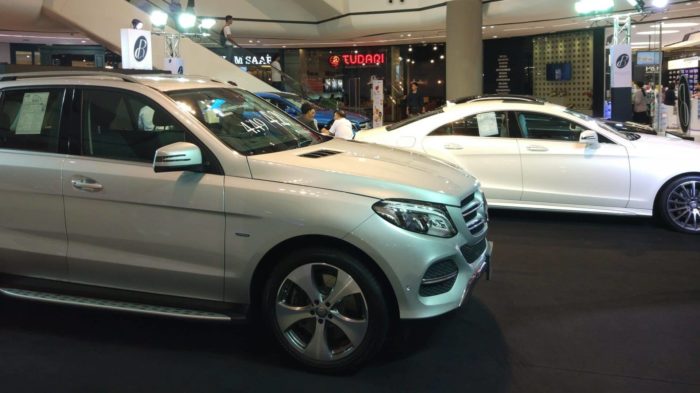
Buying a new car also means you have more finance options open to you, and you’ll get the chance to speak to the dealer. However, it can be hard for an expat to get a car loan unless you have a Thai friend to help you.
There are several things you can do in order to get additional discounts and more freebies when buying a new car in Thailand, if you know what to do, where to go, and who you talk to.
We have a list of four tips you can use to get the best price when buying a new car.
It’s one of our 100+ exclusive pieces of content available only to our premium subscribers.
To get access, please become a subscriber.
Second Hand Cars
Here’s a list of benefits of buying a used car in Thailand:
- Price: The major benefit of a used car is that you get a cheaper set of wheels. There is the potential for a bargain in Thailand, but in general, used cars hold their value well and cost more than you would pay in western countries. You can buy used cars from many sources and some of them offer the cheapest prices on the market.
- Package: You have the choice to buy a used car from a licensed dealer, which means you’ll have access to a service package or insurance.
However, there are a few things you should keep in mind:
- Car inspection: To buy a used car, you should also know how to inspect a car yourself or bring someone who can. Otherwise, you might get a car that’s in a bad condition and needs lots of surprise repairs.
- VAT: Another negative for used cars is the 7% VAT that’s added to the bill if you buy from a showroom or used car dealer, or use a loan to finance the purchase.
Tip: To avoid VAT when buying a used car, you can pay in cash from a private seller. In addition, buying from a private seller who has looked after their car is an excellent choice. Thai people call these “house cars.”
Which Brands to Buy
Looking around the roads of Thailand, you will notice two car model trends.
The first is the number of pickup trucks. This is because these cars can carry many people and have a reduced excise tax, making them a popular choice for many people.
The second is the popularity of Honda and Toyota cars. There are several reasons for their prevalence.
Japanese Brands
Japanese cars are very popular in Thailand because of prices and quality.
A majority of cars from Toyota, Honda, Isuzu, Mitsubishi, Mazda, Nissan, and Suzuki are manufactured in Thailand and are priced better than other brands.
- Honda and Toyota are the two most popular car brands in Thailand by far. This is because people trust in their quality and they can fetch a good resale price. The availability of certified mechanics is another convenience. Literally, every garage knows how to fix these cars, and parts are easy to come by.
- Isuzu is known for the pickup truck while Mazda is known for its design and functions.
- Nissan and Mitsubishi are known for performance
- Suzuki is good value for money.
European Brands
European brands are generally considered luxury cars in Thailand. They are much more expensive than Japanese brands because of an import tax, which are subject to 300% tax, making them three times more expensive than in Europe or America.
BMW and Mercedes (known as Benz in Thailand) are by far the two most popular European brands in Thailand, followed by Ford (especially their pickup trucks), Audi, Volvo, and Volkswaken respectively.
Maintenance is a main disadvantage of an European car. It tends to be more expensive than Japanese brands. Unless it’s BMW and Mercedes, finding a good mechanic to fix your car can also be a challenge. You may also not want to use an official garage all the time since the price can be two or three times more expensive than independent garages.
Also, a European brand car lose its value quickly. So, you shouldn’t expect to get a good price when you want to sell your car.
Chinese Brands
MG was the one of the very first Chinese brands to enter the Thai market in 2014. It’s been the most popular Chinese car in Thailand ever since.
Since then, more brands have been introduced into the Thai market, including GMW, Chery, and Neva.
Chinese brands are known for being inexpensive and with more functions than Japanese and European brands. On the other hand, they still have problems with part quality and maintenance.
These Chinese brands mainly sell electronic vehicles due to the tax regulations between Thailand and the Chinese Government.
Electric Vehicles (EV)
You have many choices of electric cars (EV) in Thailand.
- MG were one of the very first brands to sell electric cars in Thailand at an affordable price.
- BYD is getting more popular because of price.
- Tesla has been available in Thailand since 2023. However, the starting price is almost twice as expensive as the US. This is mainly because of import taxes.
In addition to Chinese brands as mentioned in the previous section, you can also get an EV from a brand like Lexus, Nissan, Audi, BMW, and Mercedes.
There are certain conditions, completely legal, under which you can avoid paying taxes when buying a used car.
You can read how in this exclusive content.
It’s one of our 100+ exclusive pieces of content available only to our premium subscribers.
To get access, please become a subscriber.
Please note that if you want to get an electronic car, you need to plan your route well because of limited charging stations. While many shopping malls and gas stations have started to provide charging, there are still not enough.
If you live in a condominium, you need to also check with the condo juristic person to see if they provide changing stations, and how many they have.
Read more: Electric Vehicles in Thailand: Benefits, Prices, and Where to Buy
Car Color
Black and white are the two most popular colors for cars in Thailand and would be a good choice if you were looking to sell your car after a few years. Since there’s a high demand for black or white cars, you might need to wait longer than other colors when buying a new car.
For example, if you buy a blue car, you might be able to get it right away. But a black or white version of the same model might have a waiting list of several months.
With certain models, white cars can be 5,000 to 10,000 baht more expensive than other colors because they have extra layers to make it look brighter – often called “pearl white”.
Finding Cars for Sale
There are many different options when it comes to buying a car, new or used, in Thailand. Traditional dealerships are popular but there is also an ever-growing list of online options.
New Cars
You can buy new cars in Thailand mainly from dealers at a showroom or car events.
Car Dealerships
A dealership can be reassuring because of attentive service and more legal fallback if there are any problems. It’s also easier to get finance through an authorized dealership than relying on alternative methods listed later in this article.
Going to a dealership means you have an entire range of models, and can discuss pricing options. There are car dealerships in all big towns and cities in Thailand, giving you loads of options.
Another benefit of a dealership is that you can see new and used cars and compare prices and conditions. Most official dealerships also have promotions, and provide warranties and extras on not only new cars, but used cars as well.
Different dealers have different promotions even if it’s the same car brand. And it isn’t only about freebies you get from buying a new car, but also finance options too.
If you are not in a hurry, you can shop around and ask different dealers to find out which one gives you the best promotions.
In many cases, the car dealer that you bought a car from is going to be the same place where you maintain your car during the first few years. This means if you are not happy with the shopping process, it’s best just to change dealers.
You also have the option to test drive a car if you have a Thai driving license, a license from your home country, or an international license.
As with many places in Thailand, at dealerships sales people will treat you according to your appearance. You might consider dressing up to get taken seriously.
When this writer walked in wearing a scruffy T-shirt and shorts I got little attention. But when I returned in a collared shirt and dress shoes, I had sales people jumping over themselves to help me. Maybe this was just random luck or bad customer service, but there is a correlation between the two.
Car Events and Shows
The Bangkok International Motor Show is one of the most popular places for Thai people to buy a new car. Often there are great promotions.
It is held annually for two weeks in December at the Impact Arena on the outskirts of Bangkok. All car brands in Thailand will be there to showcase their existing and also upcoming models.
In the past, the event has been criticized for being more about the pretty models, but things have been toned down and the cars are now taking center stage again.
At the Motor Show, you will be offered different promotions from many salespersons, which make it easy to compare promotions between events across all models.
This will give you an easier time making a decision on which model and dealer you want. It’s also possible to test drive within the event if you have a driving license. But it will be a quick test drive because of the number of people there.
If you already have a model you want, you can go to an official dealer in your area too. They may offer the same promotion at the Motor Show. But you will have more time to do a test drive and talk with a dealer.
A main disadvantage when buying a car during a big event like the Bangkok International Motor Show is that it comes with a longer waiting time than usual. You might need to wait for 6-8 months if you buy a popular model in a popular color from the event.
It is also common to see mini shows in the numerous shopping malls around Thailand. Places like Fashion Island seem to have at least one car company showcasing new models every couple of weeks.
They have huge signs offering discounts but it is not clear if these are the same deals you’d get at the dealership. One benefit of these events at the mall is that there is less pressure to buy and you get the chance to see and sit in the car.
Used Cars
Buying a used car can save you a lot of money if you know how to thoroughly inspect a car. Or take someone who knows what to look for.
Otherwise, you may get a car that’s only good on the outside and you will spend a good amount of cash fixing it.
Car Tents
One of my Thai friends told me I could buy a car at the tent which confused me at first, but a car tent is basically a place where you can buy used cars in Thailand from unofficial dealers.
Many cars come with limited warranties and many are sold “as seen” so you need to have a real understanding of cars to get a good buy. Tricks such as winding down the mileage and putting different parts into cars do happen, so buyers beware.
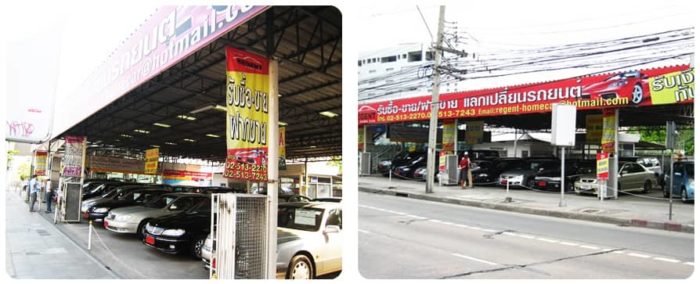
Many car tents work in conjunction with a finance company and a loan can be agreed upon on the spot. It’s best to make a payment and drive the car away.
It’s not unheard of for car tents to change out expensive parts for cheap ones when a customer pays a deposit and comes back later for the car. Also, if you pay by cash, the price of the car can be higher than if financing, since some car tents get commission from giving out loans.
If you are looking for a cheap car to get you from point A to point B then looking for bargains at a car tent could be an option.
Private Offline Listings
When I was going to buy my first car, my dad went straight to the newsagents and picked up a copy of Auto Trader Magazine. It listed thousands of used cars for sale and was like his bible. You could compare prices and specs to see what was a reasonable price for different models.
Most car businesses have moved online these days but it’s still possible to find offline car listings here in Thailand. National and local newspapers have car sections with private listings, which are worth a look if you want to go this route.
You might also see private listings at your condo. Sellers leave flyers on notice boards and the sale can progress quickly between neighbors.
Sometimes cars in the street have for sale posters or stickers on them. You might even see a for sale brochure for the car you’re looking for. There’s no exact science to buying a car, but fate might bring you to your dream car on the soi you’re walking down.
Online
Buying a car online is a popular choice. Many sites have sprung up in Thailand to cater to the desires of Internet shoppers. These websites cater toward the sales of used cars, but some websites offer sales of new cars, or links to special offers from dealerships.
There are also many listings on forums and social media which can match you up with a seller. The phrase “buyer beware” is important here, because there can be limited recourse if the buyer purchases a car as seen and turns out to be a lemon.
Good sources of online cars in Thailand are below. However, note that these online sites run by car agencies result in prices that can be higher than average market prices.
There are other sites that help you buy cars directly from sellers. Prices will be cheaper with better conditions.
Our premium subscription includes all of these reputable sites as well as tips to car inspection tips and tricks and other money saving strategies while living in Thailand.
- Motors.co.th/en – This site is easy to use and clear for used car shopping. Enter a few simple details about your budget, location, make, and model and you get a list of results. You get everything in English, and the list gives you pictures and contact number of the seller.
- Suekairod.com – The site is useful if you are looking to get a guide price and find information about your nearest dealer. A major selling point of this site is that they list cars available in dealerships, both new and used. This means that you can pick up a bargain from a dealer and not just from a private individual.
- The other option for online purchases is to look at sites like Facebook Marketplace, kaidee.com and bahtsold.com, which offer secondhand goods including cars.
Just use lots of common sense if you go this route.
Auctions
Car auctions are great to watch. The atmosphere is exciting and fun to study the tactics of the bidders trying to work out their top price. Buying a car through auction is something to be wary of for a number of reasons though.
The issue is that you have to compete against other bidders and could end up paying more than you’re prepared to in the heat of battle. At auctions you’ll have to make quick decisions and might not get a full description of the vehicle or have limited opportunities to inspect it.
However, you can sometimes get a bargain at an auction if others aren’t interested in the car you want. Those with knowledge of cars can be confident that they can spot a bargain when they see one.
If you’re interested in car auctions, check out Union-Auction which has listings for car auctions in Thai and English. Both sites give pictures and descriptions for the cars available and list fees you need to pay.
The auction is a fun, exciting, fast process. So here’s some tips to help you succeed:
- Set yourself a budget
- Check the car you would like to bid on, including the documents
- Pay by internet bank transfer for the safest method of payment
- All cars are sold “as is, where is;” there are no returns
- Read the terms and conditions
- Ensure you have the correct name registered for the auction
- Bid clearly and don’t wait until the last minute.
A quick look on Google shows there are plenty of car auctions in Thailand so you might be able to find a local independent auction close to you.
The Buying Process
When you’ve decided to go ahead and make your purchase you have a few hoops to jump through. When buying a new car it’s possible that the dealer will look after most, if not all, of the paperwork for you. But when buying from an individual, you’ll need to be more hands-on.
New Car Buying Process
Here’s what you need to do when buying a new car in Thailand.
- Paying a deposit: After finding the right dealer and car, you need to reserve the car by paying a deposit, usually 5,000 – 10,000 baht. The reason for this is that cars in Thailand are usually made to order. Sometimes, it may take up to six months for the car to be delivered to you. You should get the receipt after paying the deposit, stating everything about your new car including: model, color, delivery date, and all freebies you got from the negotiation.
When the car arrives, here’s what you need to do:
- Prepare Cash: Ask the dealer about how to pay a remaining payment. Most of the time, they accept a cashier check, which can be bought at the bank, or a wire transfer.
- Prepare Document: Give the following documents to the dealer for a car registration:
- Passport (signed copies of all visa pages and information page)
- A signed copy of a work permit or a certificate of residency issued by the Immigration Bureau or the applicant’s embassy
- A valid Thai driving license
- Check the Car: You need to check the car from bumper to bumper. Be sure to take it for a test drive. Check the warranty for the manufacture date, inspection dates, and customer details. Make sure everything is perfect before accepting the car. If possible, bring a car expert with you. Also, write down the engine number to make sure that this is the same car you inspected.
- Check Documents: You should receive all documents on that day including car insurance, CPTL, car manual, the temporary red book, and the tax sticker.
- Check all Freebies: Bring a copy a receipt with you and slowly check all freebies included there.
- Transfer to a White Plates: New cars will need special red license plates which will be replaced with the official white plates in a few months. The cost of these temporary ones is around 2,500 baht but you will be refunded when you change over to the white plates.
- Wait for the Official Blue Ownership Book: You will get your official blue ownership book a few days after or on the same day you receive the white plates. If you finance the car you’ll get a copy of the blue book. The finance company will be listed as the owner of the car. The blue book and car will be transferred into your name once the loan is paid off.
Driving with Red License Plates
When driving with red license plates there are a few things you must be aware of.
First, you should always keep your ownership papers, the temporary red book, and transfer documents with you. If the police decide to stop you then you’re liable to pay a fine if you can’t prove ownership.
Second, with red plates you are restricted to driving during daylight hours and in the province the car is registered to. If you want to drive to other provinces or at night time (after 8pm), you need to write down the date and destination inside the temporary red book.
Failure to transfer from the red temporary plates to the white official ones can result in a fine if you are pulled over by the police. A lot of people do like to keep red plates on just to show that they have a new car.
Booking a Specific Car Registration Number
If you want a specific registration plate number, you can do it yourself online if you can read Thai at the Department of Land Transport website on weekdays from 10am to 4 pm. You only need a chassis number, which you can get from the dealer.
Everyday on the Department of Land Transport website, it shows you a list of available registration numbers sorted by Thai alphabet and number. If it doesn’t have the alphabet or number that you want on that day, you just need to wait until it’s available.

There are some people who wait for almost a year in order to get the number and characters that they want. During this time, they just keep driving their new car with a red plate. While it’s not entirely legal, it happens.
Once you can successfully book your desired number, you can print out a confirmation document and hand it over along with a copy of your passport, residential certificate, and the car purchase contract to your dealer for a car registration process. After that, you should get a white plate within a week or two. Although some dealers may take longer than that.
Depending on your negotiation skills, it’s possible to ask a salesperson to book a specific car registration number for you too. If you don’t book a specific number, it will be assigned randomly depending on what’s available on the Department of Land Transport website at that moment.
Used Car Buying Process
Buying a used car in Thailand can be complicated. There are 5 common scenarios that you could end up dealing with.
You can read about them in our complete guide to buying a used car in Thailand.
It’s one of our 100+ exclusive pieces of content available only to our premium subscribers.
To get access, please become a subscriber.
Transferring Your Car
When you buy a used car, you also need to transfer a car yourself, which can be done at the Department of Land Transport.
The transfer process involves several steps. The first is to submit all paperwork and get it checked and stamped by an official. At this stage, they may ask you to come back in a few days if you bought a car from another province.
When everything has been checked, you need to come back and inspect the car. The inspection makes sure the car matches the details on the submitted forms and that there are no other problems. Finally you will be asked to come back to collect plates and the Blue Book.
If the car is transferred within the same province, everything should be finished within a few hours. If it’s transferred to another province, it will take a few days.
The transfer cost is different based on the estimated amount of the sale value of your car. There’s a 105 baht transferring fee and a stamp fee of 0.005 baht from the estimated car price. For example, if the car is estimated at 300,000 baht, the total transfer cost would be 1,605 baht (105+ (300000 x 0.005)).
Finally, if you are unable to do it yourself, you can give the power of attorney to another person to complete the paperwork for you.
Used cars registered in a different province will need a new set of plates. The cost of this is around 200-300 baht.
Finance Options
One of my biggest concerns when buying a car was where the money would come from. Even with the cheapest models I would still need to borrow to complete the sale.
It’s possible for foreigners to get loans in Thailand to buy a car but there are strict restrictions. And it’s getting much harder for foreigners to get a car loan.
- The foreigner must have a bank account with good standing at a local bank.
- You need a work permit or similar showing you are here long term.
- Some people stated that they have been successful getting a car loan using a tourist visa, but it seems to take a lot of effort, requires a much higher deposit payment, and is decided upon by the manager at each place.
- For the first car a foreigner buys they will need a Thai guarantor. This can be a relative or friend but they need to be aware of the situation and what happens if the foreigner defaults on the loan. For the purchase of all cars thereafter and where the loan is through the same source, a guarantor is not needed. The exception to needing a guarantor is when the deposit payment is between 50-70%.
- The final stipulation for getting a loan is that a minimum down payment of around 20% is required.
Sometimes a bank will ask for a higher down payment if you are new in the country or have limited funds in your bank. Either way make sure you prepare copies of your work permit, passport, bank statement, and wage slips before applying for a loan.
Interest rates for a car loan in Thailand is around 2% – 4%. It can be more or less depending on the amount of down payment and lease duration, which is normally in the range of 24 months to 84 months.
During a promotion period, it’s possible to get an interest rate of less than 1%, if the amount of downpayment is over 25% and duration is shorter than 48 months.
However, if you get a good deal on the interest rate, you will get fewer freebies when buying a car, as a car dealer will make less profit from you.
Now let’s look at your financing options.
Through the Car Dealer
Many people apply for finance through the car dealership where they purchased the car. The benefit here is that the car dealer will have a good relationship with finance sources and it could be easier than going through a bank.
For a foreigner this might be easier if buying new from a showroom as you’ll have to deal with only one company for the purchase and loan. It also means you can build a financial relationship with the dealer when it comes to upgrading your car or replacing car parts.
In case a certain financial institution doesn’t give you a lease, a car dealer might also be able to find a new bank for you. This is because they want to get a commission from selling a car to you.
Make sure your dealer is authorized to finance your car.
Official dealerships are fine but sometimes private firms might bend the rules and regulations when it comes to giving a loan.
Through the Bank
The rate of loan defaults has been rising due to the poor performance of the Thai economy and increasing household debt. Therefore the conditions for getting a loan have become stricter and the bank may request a Thai guarantor based on your circumstances.
One positive is that the banks are prepared to loan money to foreigners for auto purchases, unlike when it comes to financing property. They also offer special incentives such as 0% interest introductory offers.
For more information on available offers from major banks in Thailand, follow the links below and speak with the banks.
Krungsri

You can find many options for financing a car at Krungsri . The Krungsri new car option looks good and works like a hire-purchase agreement. Foreigners need a work permit and must show proof of employment to get this loan.
SCB

SCB offers various finance options for both new and used car purchases. You will see they offer loans of up to 95 for new cars and 90% for used cars. The payback term lasts up to 84 months and is available to Thais and foreigners. All applicants must be living in Thailand and show proof of funds with six months worth of bank statements, as well as proof of address.
Bangkok Bank

There are different types of personal loans offered by Bangkok Bank. One interesting option is using your savings as collateral to gain up to an additional 100% on a loan. The payback term is up to ten years and is subject to approval based on the amount of savings you have.
However, loans from Bangkok Bank are mainly available to those who have a payroll account with them.
Insurance
There are several different types and levels of insurance in Thailand and it is important to know which ones are mandatory and the difference between them all when making a buying decision.
We have a separate article on car insurance in Thailand providing you everything you need to know on this topic.
Tax
As part of the initial registration process you will pay tax. Tax depends on the make and model of your car and can be between 800-10,000 baht per year.
If it is a new car, your car dealer will be able to tell you in more detail how much tax you will be expected to pay.
After that, you need to renew your car tax every year.
Maintenance
Driving along most roads in Thailand you will see garages and people working on cars. There are enough places to take your car to if it needs a tune up or if something major has gone wrong with it.
While you hope your car will run forever you’ll have to get bits and pieces replaced or repaired over time. These little things might not be included in your insurance coverage if there is an excess ,so you will need to find someone to make the repairs.
If you buy a new car from the dealer then it’ll be covered for repairs and services for a set period of time–normally three years. If you decide to do work in another garage then it’ll void any further inclusions under the special package you got when purchasing the car.
The numerous roadside garages do a good job and are useful if you are in need of urgent repairs. Simple tasks like oil changes are often much cheaper than at official service centers and the labor cost is much lower.
Some gas stations provide simple car service and repairs. To find a reputable garage where you live, talk to friends who have the same car model as you. Ask them where they go. Most roadside garages are more up to speed with Japanese models, but there are some repairmen knowledgeable in European brands as well.
Most people budget around 10,000 baht to 20,000 baht baht a year for maintenance costs but this varies depending on the age and model of car you have.
Read more: The Real Cost of Owning a Car in Thailand
Can I Buy a Car Using a Tourist Visa?
Although you can buy a car with a tourist visa, you can’t legally register your car under your name.
This is because the Department of Land Transport always asks for a work permit, an affidavit of residence from your embassy in Thailand, or a residence certificate from the immigration office. And this is only available to those who have a valid long-term visa.
Selling Your Car
The steps for selling your car work like the advice given above. However, you need to think about the best way to sell it. If you’re part-exchanging you may sell to a dealer but if you’re leaving the country you might find a better deal by selling to another person.
Selling Privately
If you have a friend or a colleague then this might be an easy way to get a quick sale. You can advertise around your company or through Facebook – there are always a lot of adverts and people looking to buy. The negative is that if you’re on a tight deadline, getting a deal completed can be difficult and stressful.
The paperwork is not too difficult but you will be responsible for doing it and going to the DLT with the correct documents and blue ownership book. The other option is to give all the required documents (stated in the paperwork section for used cars above) to the buyer, who will then go through the process themselves. Make sure you have the usual selection of photocopies of your visa, passport, and proof of address with you when transferring your car.
However, one thing to be careful of is that if the buyer doesn’t complete the car transfer, and the car is still registered in your name, you’ll be the responsible person if they get into trouble with the car.
Selling to a Dealer or Car Tent
This is a convenient option if you want to part-exchange and get a new car. The dealer will give you a better price to part-exchange rather than to sell. A lot of people head to car tents when they are in a rush and want a fast payment. You might not get the best price but it will be done quickly.
Selling at Auction
If you have a rare car or a car that might create some interest, then look at an auction. Especially if you’re not happy with the prices offered by dealers.
Well advertised auctions give you the chance to attract a lot of bidders if it’s a well-respected auction and you have a special car.
Do I Need to Sell if I Leave Thailand?
This depends on your visa status. If your Thailand visa is active while you are out-of-country, then you can keep your car in your name. If not, then you need to sell your car.
If you are holding a work visa and will be returning to your home temporarily for three months, you don’t need to sell your car if your visa is active during that time.
On the other hand, if your visa expires while you are back home, then you should sell your car before you leave Thailand.
Now, on to You
We hope that this article gives you all the information you need when it comes to buying a car in Thailand.
Some people may think that a private car isn’t necessary in Thailand. But it is much more convenient (and fun) to get around Thailand when you have a car, especially if you have a family or don’t live within a city area.
If there’s any questions you want to ask about buying a car in Thailand, please feel free to do so in the comment section below.




